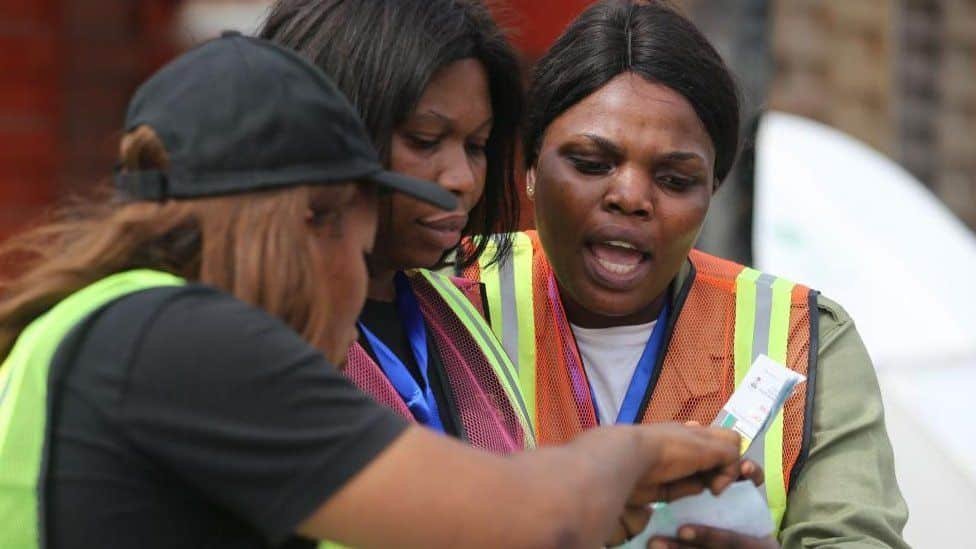Nigeria held its presidential and national assembly elections on February 25, 2023, which was hotly contested and marred by allegations of vote buying, voter suppression, and other electoral malpractices.
According to the Independent National Electoral Commission (INEC), Bola Tinubu, the ruling party candidate, won the presidential election with 37% or nearly 8.8 million of the total votes cast, while Atiku Abubakar, the main opposition challenger, secured 29% or 6.98 million votes, and Peter Obi, a first time presidential candidate, popular among the youth, garnered 25% or around 6.1 million votes.
Tinubu is now President-elect
Per Nigeria’s electoral law, a candidate can be declared a winner if they win more votes than their rivals, provided they bag 25 per cent of the vote in at least two-thirds of the 36 states and the capital city Abuja.
The aftermath of the elections
Nigeria had high expectations for the elections, with many supporters of Peter Obi, impressed by his youthful exuberance and belief that he is the best candidate to alleviate the hardships Nigerians face.
Despite being projected as the fairest and most transparent contest in the country’s history, there have been accusations of foul play from opposing parties.
Although the candidates have not issued an official reaction, loyalists of the defeated parties have expressed their dissatisfaction with the declared results, alleging various forms of electoral malpractice.
All information has been verified for accuracy, and the grammar and content have been reviewed to meet industry standards for online news platforms.
Julius Abure, Chairman of Obi’s Labour Party, has called for the scrapping of the presidential elections, describing the results as a “sham,” while Abubakar’s Peoples Democratic Party (PDP), the main opposition party, has backed the demand for a revote, along with the small African Democratic Congress (ADC).
The Labour Party has called on the INEC to conduct fresh elections within the window period provided by the electoral act.
Furthermore, there are indications that the electoral process was fraught with challenges owing to new technology that did not function well and seemed to overwhelm Nigeria’s notoriously inadequate communications network. This has been cited as a reason for the main opposition parties’ rejection of the results as fraudulent.
The future of Nigeria now lies in the hands of Bola Ahmed Tinubu, who has held a press conference declaring his acceptance of the election results and thanking the other parties for participating in the elections. It remains to be seen whether the opposing parties will drag the Electoral Commission and the President-elect to court or whether this will just remain one of the associated challenges with every election.
There were reports of Children voting in Kano state during Saturday’s elections. There were also several reports of seizing and vandalising of ballot boxes in Edo state and Lagos.
Chairman of INEC, Prof Mahmood Yakubu, during a press brief also acknowledged a similar incident in Abuja. According to him some BVAS machines were snatched from electoral officials.
Following these activities, which compromised security in some states, there were delays in the voting process.
Additionally, he mentioned that polling units in Niger, Delta and Katsina states were attacked by thugs and eight BVAS were snatched by thugs, noting that three of the BVAS machines were later recovered.
There were also reports of people being murdered during the election process. On Dipolubi Street in the Surulere area of Lagos, for instance, a woman, Efidi Bina Jennifer, was allegedly stabbed by thugs loyal to a political party at the polling unit.
She, however, came back to cast her vote after being given first aid treatment and wearing heavy bandage on her face and dripping with blood. A pregnant woman identified as Ruth Osah, and a member of a local security outfit, Mark Orduize, were allegedly killed at a polling unit in the Ubimini community, Emuoha Local Government Area of Rivers State.
Hoodlums suspected to be supporters of a political party in Akwa Ibom State inflicted machete cuts on two voters before carting away a Bi-Modal Voter Accreditation Machine System machine for units 11 and 12 at the West Ward I in the Onna Local Government Area of the state. All these incidents disrupted the elections.
Will this be enough grounds for the opposing parties to drag the Electoral Commission and the President elect to court or this will just remain one of the associated with every election?
Source: The Independent Ghana

